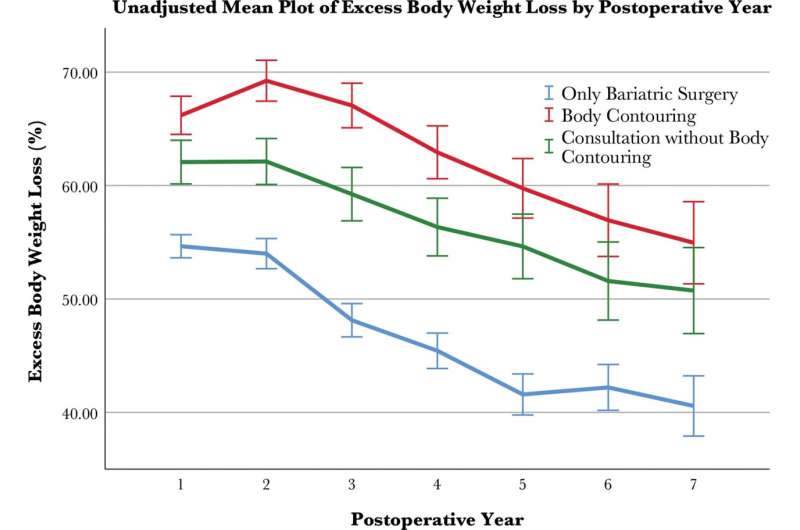This article has been reviewed according to Science X's editorial process and policies. Editors have highlighted the following attributes while ensuring the content's credibility:
fact-checked
peer-reviewed publication
trusted source
proofread
Does body contouring increase long-term weight loss after bariatric surgery?

For patients with massive weight loss after bariatric surgery, subsequent body contouring to remove excess skin is not itself associated with long-term weight loss, reports a study in the June issue of Plastic and Reconstructive Surgery.
"In contrast to previous studies, we found that body contouring procedures do not lead to improved weight loss or weight maintenance after bariatric surgery," comments ASPS Member Surgeon Teresa Benacquista, MD, of Montefiore Medical Center, Bronx, N.Y. "Rather, the reported benefits of body contouring appear to be in improving quality of life."
New look at how body contouring affects long-term weight loss
Body contouring refers to a range of surgical procedures to remove excess skin in patients with major weight loss, with the aim of improving the patient's appearance, reducing discomfort, and improving physical function. Previous studies have suggested that patients who undergo body contouring have more sustained weight loss over time, although some studies have reported conflicting results.
The study included 2,531 patients who underwent bariatric surgery between 2009 and 2012. Of these, 350 patients underwent body contouring a median of two years later. Another 364 patients consulted with plastic surgeons about body contouring, but did not proceed to surgery. The remaining 1,817 patients had neither body contouring nor a consultation.
At follow-up, patients who underwent body contouring did indeed have more sustained weight loss. After one year, average body mass index (BMI) was about 3 kg/m2 lower in the body contouring group, compared to patients who had bariatric surgery only. By seven years, BMI was 5 kg/m2 lower for patients who underwent body contouring.
However, weight loss was also greater for patients who had a consultation but did not proceed with body contouring. For this group, average BMI was 1.5 kg/m2 lower at one year compared to patients without a consultation, and 2.3 kg/m2 lower after seven years.
Further analysis focused on 259 patients from the consultation group who had sufficient weight loss to be considered candidates for body contouring. For these patients, average BMI after seven years was about the same as for patients who underwent body contouring: 31 versus 30 kg/m2, compared to 35 kg/m2 for those with no consultation or body contouring. Analysis by percentage of excess body weight lost showed a similar pattern.
Differences in long-term weight loss by type of surgery and race/ethnicity
Weight loss was also affected by the type of bariatric surgery: patients undergoing a procedure called sleeve gastrectomy had lower sustained weight loss, compared to gastric bypass. Among body contouring patients, average difference in excess body weight loss was about eight percent at seven years' follow-up.
Black patients had lower sustained weight loss, compared to other racial/ethnic groups. In contrast to previous studies of weight loss after bariatric surgery, most patients in the new analysis identified as Black (about 29%) or Hispanic/Latinx (62%).
The study raises questions about the effects of body contouring on long-term weight loss after bariatric surgery. Noting the similar responses in patients who underwent body contouring versus those with consultation only, Dr. Benacquista and co-authors write, "The impact of body contouring on weight loss is likely minimal, and the difference in weight loss as compared to the 'bariatric only' group is secondary to individual patient factors."
The researchers add, "The apparent benefits of body contouring in massive weight loss patients is likely psychosocial, related to improvements in physical functioning."
More information: Nicolas Greige et al, Analysis of Body Contouring and Sustained Weight Loss in a Diverse, Urban Population: A 7-Year Retrospective Review, Plastic & Reconstructive Surgery (2022). DOI: 10.1097/PRS.0000000000010097




















